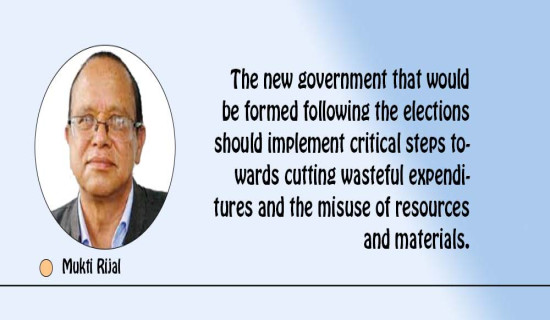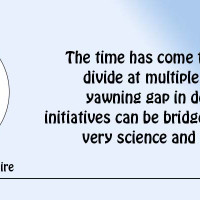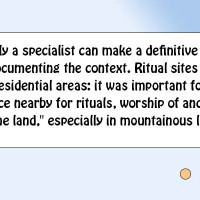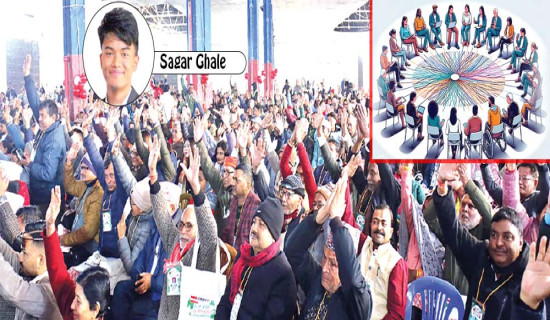- Friday, 23 January 2026
Lalita Niwas Land Scam Culprits Must Face Punishment
The current government’s efforts to thoroughly investigate major scams, such as Lalita Niwas land and fake Bhutanese refugee scams, and hold the perpetrators accountable, have won praise from the general public. Among the many scandals that have plagued the country, the Lalita Niwas Land fraud has drawn a lot of attention because it exposed collaboration between politicians, bureaucrats, businessmen, middlemen, and others. The Sharda Prasad Trital Commission, which examined the land scam and submitted its report roughly five years ago, listed the names of persons involved in the land grab and suggested that the government commence the indictment process against individuals who have illicitly captured the government-owned property.
Initially, following the exposure of the scandal, the anti-graft body, the Commission to Investigate Abuse of Authority (CIAA), filed a case of corruption and misappropriation against 175 people at the Special Court, which has yet to pronounce its final judgement. Recently, as directed by the government, the Central Investigation Bureau (CIB), an arm of the Nepali Police, launched its investigation into the scam. The CIB intends to discover the culprits' role in falsifying official documents and engaging in other forms of organised crime while transferring government-owned land in their own and others' names to sell them. Many of those arrested were previously charged in the same scheme but were released on bail. The CIB has been detaining people involved in registering government land worth billions of rupees in their names.
Comprehensive investigation
Following a ‘comprehensive investigation’ into the land scam, the CIB has discovered over 400 individuals who are, one way or another, guilty of having their names in the scam, shifting around 143 ropanis of Lalita Niwas land into private hands. Former prime ministers, ministers, government secretaries, officials, and middlemen are among those accused of land theft. The swindle began in the 1990s with the confiscation of government land from the original owner, the Late Subarna Shumsher, and his family members in the early 1960s. The Lalita Niwas land area is approximately 300 ropanis (approximately 15 hectares), and it currently houses the official residences and offices of the Prime Minister and other high-ranking constitutional figures, such as the Chief Justice and Speaker, as well as the main office of the country's central bank.
Following the restoration of democracy in 1990, the land grabbers began collaborating with ministers, secretaries, and land revenue department officials to register the valuable land in the names of various individuals. During this time, numerous individuals and officials, as well as authorities, accepted bribes in the form of land. Following that, offenders sold the land to middlemen who attempted to obtain additional land from Lalita Niwas by generating phoney paperwork, fake owners, and fictitious tillers and using loopholes in existing legislation.
This is without a doubt the largest land swindle in the country, and several persons, including a major businessman who owns premium department store chain. The businessman has been arrested, along with several officials. The CIB's decision to reopen the investigation into the scam has rekindled hope among people who have been expressing their outrage over rampant incidents of economic irregularities, corruption, abuse of power, and impunity. Such unsavoury events gripped the nation more since the country became a federal republic state with the success of the 2006 people's uprising.
Meanwhile, the Lalita Niwas case serves as yet another illustration of our society's systemic corruption and its direct association with impunity. We've seen countless cases when people with links to important figures escaped prosecution. Despite investigations revealing the perpetrators, authorities frequently hesitate to charge them. Given the involvement of persons related to political parties and high leaders in scandals and scams, many assume that these individuals will face fewer consequences, as it may jeopardise the stability of the ruling coalition.
Unfortunately, many people criticise the government for failing to apprehend prominent personalities. In the past, this has resulted in a lack of faith in the government's efforts to tackle corruption. However, contemporary corruption investigations have implicated high-ranking officials from powerful political parties, including former deputy prime ministers, home ministers, secretaries, bureaucrats, and others. This sends a clear message that the state prioritises fighting crime, regardless of the individual's status. Nonetheless, it is critical to await the court's decision to assess their guilt or innocence.
It is widely held that inquiries into corruption cases should not be delayed or postponed since justice delayed is justice denied. The government must speed up the inquiry and indictment process to ensure that no offender escapes accountability while protecting the rights of the innocent. Ongoing investigations by the government and appropriate authorities should be continued, with timely and transparent reporting of results.
Citizens’ trust
With the Prime Minister's pledge to hold every offender accountable, public expectations for justice and accountability have gone up lately. Both the Home Administration and the CIB have an opportunity to demonstrate their effectiveness throughout these current investigations. Simultaneously, the challenge for these agencies and the government is to scrutinise individuals in positions of power. Citizens' trust in the government and the state will only grow if the current inquiry and indictment procedure is conducted honestly.
To summarise, investigating and punishing the culprits of the Lalita Niwas land fraud and the false Bhutanese refugee scams will surely increase public trust in the country's criminal investigation and prosecution system. The present government has stepped up investigations into the Lalita Niwas, false Bhutanese refugee cases, tax evasion, and corruption charges involving gold offering for making water receptacle (jalhari) at the Pashupatinath Temple, among other scams and fraudulent acts. These measures indicate the government's true commitment to eliminating corruption, which is critical to ensuring that our society remains free of corruption.
(Upadhyay is a former managing editor of this daily.)

















